The coronavirus pandemic has changed commercial life. Whole industries stopped, many countries went into lockdown, business plans were torn up, and marketing communications had to be written from scratch. Here’s how companies – large and small – have stepped-up or adapted in different ways.
How do you keep your business and brand going during a global crisis? How do you run a marketing campaign when your customers (and staff) are locked down at home? Companies are stepping-up around the world, giving back, and transforming the way they operate to deliver value to customers, consumers and the hundreds of millions struggling around the world.
Making donations that matter in the fight against coronavirus
Helping customers and their staff navigate the crisis
Product innovation and retooling the production line to tackle Covid-19
Adapting creative and campaigns to maintain relevancy during the Covid-19 crisis
For each of these sections, we have a collection of examples to show you what companies are doing. If you’re a marketer or business leader, then also see our pages on communications audits and Covid19 crisis management support.
Making donations that matter in the fight against coronavirus
Global: Unilever donated €100m in supplies to Covid Action Platform
Hand washing and household supplies became more important than ever, with consumer packaged goods firms on the frontline to deliver these goods. Panic buying had lead to a scarcity on supermarket shelves, meaning some of the most vulnerable people in society were not getting access to supplies.
Unilever, one of the largest FMCG firms in the world, provided free soap, sanitiser, bleach and food to the value of €100m. Around half of this donation was distributed via the World Economic Forum’s Covid Action Platform, which aimed to mobilise business support to deal with the crisis. Unilever also provided $500m in cash flow relief to support hard-hit suppliers and small-scale retail customers in its value chain.
To help tackle this pandemic, we’re donating €100m of soap, sanitiser, bleach & food to emergency efforts; supporting our vulnerable suppliers/customers with €500m of cash flow relief; & protecting our workforce from sudden drops in pay. @wef https://t.co/LQxI4sbf1X pic.twitter.com/orVLJ2PUrB
— Unilever #StayHome (@Unilever) March 24, 2020
Australia: Optus thanks health workers with free mobile access
As communities across Australia faced-up to the challenges of Coronavirus, and digital communication was more valuable than ever, network operator Optus waived keyworker’s postpaid mobile access charges for three months.
In addition, Optus announced a range of initiatives to help keep customers connected during this time, including boosting mobile data allowances, suspending Optus Sport subscription fees until 31 May 2020 and making all fixed broadband plans unlimited until 31 May 2020. Optus CEO Kelly Bayer Rosmarin said: “We understand how much everyone is relying on communications services to keep our communities – including our health professionals – connected. We will continue to work tirelessly to maintain the strength of our network and to prioritise critical service needs.” This warmed all Australians to the brand as well as creating loyalty among the keyworkers.
To Australia’s healthcare heroes, we say thank you.
To show our appreciation, Optus is proud to waive postpaid mobile access charges for 3 months.T&C: Eligible Optus customers will be able to apply for this waiver online until 30 April 2020.
— Optus (@Optus) April 3, 2020
USA: Chipotle gives away 100,000 free burritos for medical staff
In a crisis, even small tasks like grabbing some takeouts for lunch are complicated and tiring. Overworked medical professionals in the USA were treated to free meals as take away brands delivered. Chipotle gave away 100,000 free burritos to healthcare workers in honour of National Burrito Day on April 2. Those who wished to register their medical unit could apply using this form and receive a free burrito box delivered by DoorDash during World Health Worker Week. The burrito boxes contained either 25 or 50 burritos.
The chain also extended its free delivery on orders over $10 made on the Chipotle app or through Chipotle.com through April 30. Fans who ordered on National Burrito Day got a free serving of queso blanco when they added it to an entree. Chipotle also used tamper-evident delivery, (which includes a seal or sticker on your order that will ensure the food has not been opened on touched during delivery).
To all the healthcare heroes: thank you ❤️ Get free burritos delivered to your medical facility next week. Submit your team today and see terms here: https://t.co/Bu9bus872k
— Chipotle (@ChipotleTweets) April 1, 2020
UK: Vodafone lightens the pressure with free unlimited data to customers
Communication channels became more vital than ever during the lockdown, with friends, families and co-workers physically separated. Network operators had the opportunity to step up in all countries, and this is a typical example. Vodafone offered free unlimited mobile data to half a million of its pay monthly customers. The mobile network said it was doing so as part of its support measures during the coronavirus pandemic.
Customers considered “vulnerable” were automatically upgraded, it said, while others could apply. It came a day after Vodafone faced criticism for announcing price increases during the crisis. Many mobile operators and other services raise their prices in April each year, by an amount linked to inflation. Other operators had already announced their price increases before people began to lose their jobs during the coronavirus shutdown.
Scotland: Online retailer TRTL donated 5,000 compression socks to help Scotland’s nurses fight fatigue
Medical professionals were facing unprecedented challenges to cope with an influx of patients – and fatigue was setting in. In Glasgow, online travel accessories retailer Trtl, whose sales dropped 95% in just two weeks due to the virus shutdown, donated 5,000 pairs of compression socks to help local nurses combat Covid-19. The colourful knee-length socks helped 5,000 acute nurses in six hospitals across Scotland fight fatigue in the following weeks.
The firm pledged to give away 5,000 more to nurses in London, bringing the total to 10,000 (£250k of donations). Trtl (pronounced ‘turtle’) donated the compression socks to acute nurses in hospitals across Scotland. The company, which employs 30 people in Glasgow, had stockpiled thousands of the socks in advance of its peak summer season. The donations gave immediate benefit to local healthcare workers, and made people feel good about the brand. As the travel industry went “on hold”, this also tackled storage challenges of excess inventory.

USA: T-Mobile skipped April Fools for charity drive instead
Seasonal marketing campaigns need to go on-hold in a crisis. That’s why most brands skipped April Fool’s Day in 2020. A global pandemic and damaging fake news meant clear, expert advice needed to be heard above the noise. T-Mobile went one step further by finding a way to create conversation around April Fools Day, without a traditional marketing campaign. They donated $1 to the Boys and Girls Clubs of America for each tweet with the hashtag “GiveThanksNotPranks.”
Phone maker OnePlus joined the cause, saying it would pledge $50k toward T-Mobile’s effort. Major League Baseball became involved, with Seattle Mariners and Republic Wireless were also among some of the brands who retweeted T-Mobile’s message.
Our heart is full ❤️
Keep sending us your thankful stories with #GiveThanksNotPranks. Each tweet is a donation 🙏 https://t.co/EkYW12hj4G— T-Mobile (@TMobile) April 2, 2020
Global: Mobile games developers team up to aid global charities
In the crisis, people’s home-entertainment skyrocketed. Streaming media and gaming services were among the biggest beneficiaries. Recognising this, a group of leading mobile game developers joined together to support charities fighting the Coronavirus, which needed funding more than ever. Each dedicated a proportion of their global advertising inventory to support a selection of charities, including the Make-A-Wish Foundation (UK), SpecialEffect, and BuildAid.
Together the group of developers had a global audience of over 100 million Daily Active Users. They comprised of DoDreams, MAG Interactive, Popcore, Miniclip, Ilyon Dynamics, Kwalee, Masomo, plus many others. “With many people stuck at home around the world, gaming publishers are seeing record usage. We are all pleased to be able to give free access to advertising inventory for a group of charities that face a critical challenge over the next few months.” said Pieter Kooyman, Chief Advertising Officer for Miniclip. This made consumers feel good about the brands, dealt with a massive over-supply of inventory at a time when marketing budgets for most firms were put on ice.
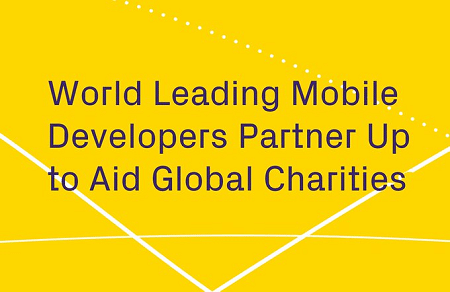
UK Freebike distributes sanitised cycles to local hospitals for keyworker commuters
Travelling to and from work on public transport carried a high risk for key workers. They had to continue to work even in countries on lockdown, and were looking at ways to reduce their own risk of contamination.
The Freebikes cycle share scheme distributed bikes to London hospitals to use as free and safe transport for key workers. Each one was cleaned and sanitised before being passed on to a new user.
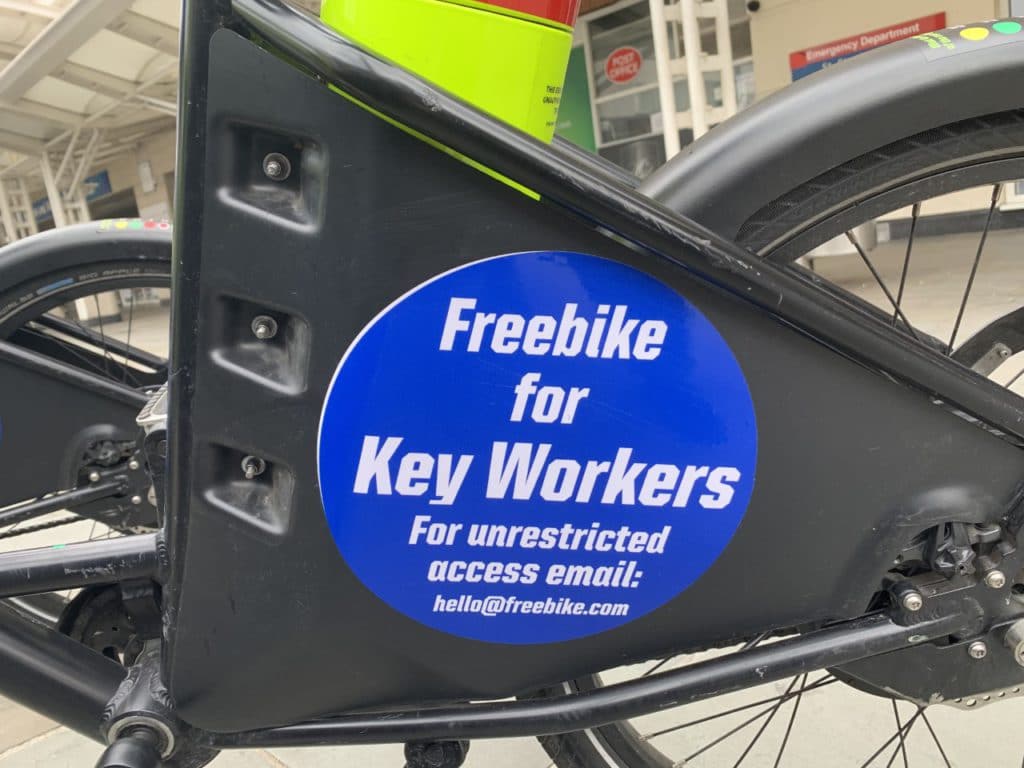
Local restaurants offer discounts to key workers
During the crisis, key workers needed to keep working even if their countries were in lockdown. Many restaurants and take-away food retailers were also allowed to continue trading, within the new restrictions. For the small businesses they were looking for ways to maintain customers, and saw an opportunity to help keyworkers at the same time.
There are thousands of examples of this, and this one from an Italian restaurant, Paggs, offered 50% off to health and emergency workers. Customers showed their ID and were granted the discounts, and all who saw the marketing felt more open to the brand. The lower margin on the discounts would have been offset by the increase in volume.
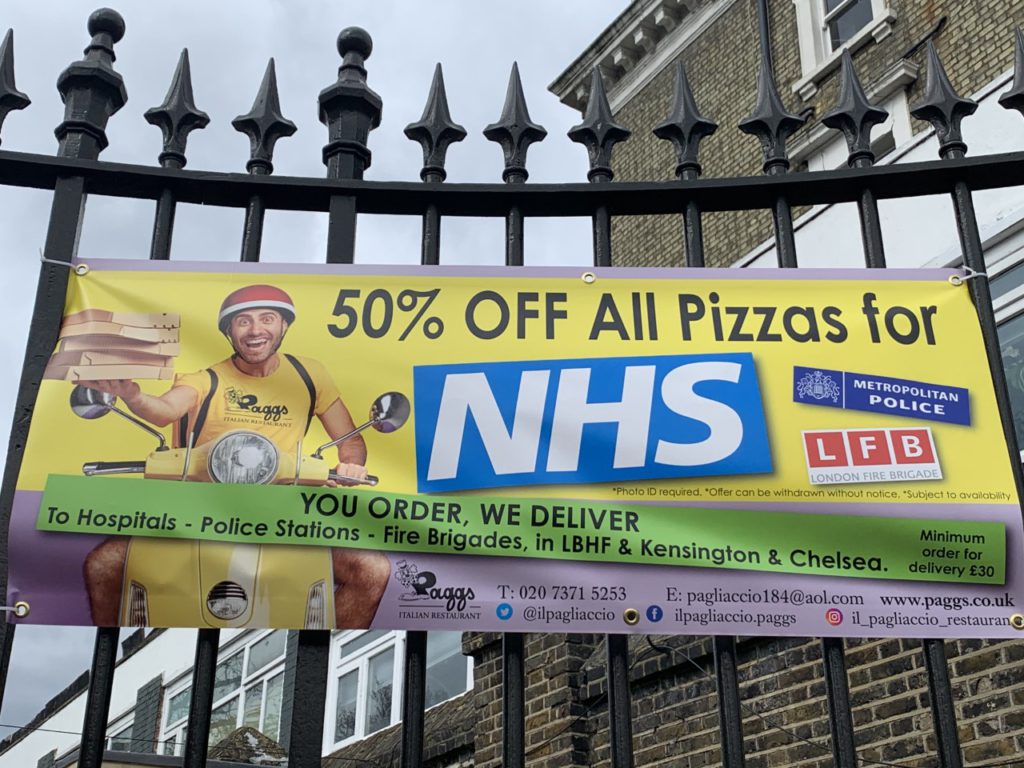
Helping customers and their staff navigate the crisis
Global: Unilever Food Solutions helps catering chefs adapt to virus challenges
The food industry was in chaos, with most restaurants closed, others repurposing as takeaway/delivery only, and managers trying to figure out how to navigate the crisis. Unilever’s global B2B food’s business stepped in to help chefs and managers.
They identified the unique needs of the moment and created learning modules for chefs around the world, who were facing exceptional challenges in the mass catering business. From food safety and delivery, to nutrition and immunity support, the modules were created at speed to help teams around the world from Singapore to the USA.
USA: Miller Lite encourages people to 'tip your bartender'
Work in many trades stopped, leaving people and households without an income. In the bar and restaurant industry, most staff in every country in lockdown were either put on hold, furloughed, or let go. Drinks company Miller Lite reached out with a helping hand to struggling bartenders, who were made unemployed due to the mass closure of bars worldwide. The American beer company tweeted a photo of an abandoned pub in support of their campaign “#VirtualTipJar”, which aimed to raise money for bartenders who had been put out of work.
The owner of Miller Lite, Molson Coors, volunteered an additional $1m as an estimated 241k US restaurants and bars closed their doors in the early stages of lockdown. This initiative directly helped the workers who had lost their jobs, but also boosted recognition in the Miller Lite brand – something they would benefit from in the future. For bar managers, such an action could also influence their future buying behaviour, showing that this is strategically smart for the business as well.
Join us in supporting those that support us. Click to donate to the @USBGNCF Bartender Emergency Assistance Program #VirtualTipJar
Donate here: https://t.co/xmAQcxUtes pic.twitter.com/B6HLsHIjcF
— Miller Lite (@MillerLite) March 20, 2020
UK: Supermarket giant Tesco ringfences time for health service workers
While much changes in the coronavirus crisis, some things stay the same. People need to shop, even if shortages in the supply chain means many products aren’t available. But what about healthcare workers and ensuring they can get the food they need? That was the challenge answered by Tesco and a group of supermarkets in the UK who set aside dedicated opening hours to ensure healthcare staff were looked after while they were busily looking after everyone else.
PR and out of home media (like this digital poster outside a central London hospital) were used to quickly alert 1.2m workers in the UK’s National Health Service. This rewarded keyworkers, stimulated demand for the service, and managed the expectations of all customers. The initiative raised brand equity for Tesco as a family brand looking after its community.
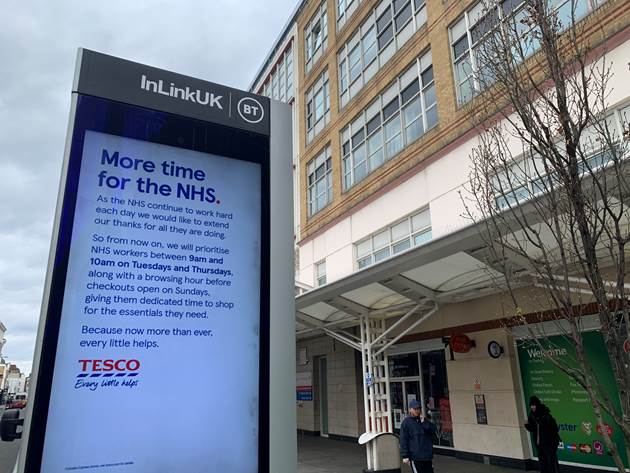
Global: Wedding site helped locked down wedding industry
Public events were cancelled across the globe – and weddings, often planned months, and years, in advance and generating a huge amount of business, were suddenly cancelled. The Knot Worldwide, which owns wedding sites The Knot and WeddingWire, helped its advertisers—vendors like caterers, flower companies and apparel brands— with financial assistance. The wedding industry, which typically ramps up in the spring, had been a hard hit by the pandemic, with more than half of Americans postponing their weddings.
The Knot’s Vendor Assistance Program included $10 million to help the company’s local advertisers with their advertising payments. The site also rolled out new editorial features to help couples continue to plan for their nuptials, even while homebound, like a virtual concierge. In a blog post about the new offering, Knot CEO Tim Chi struck a hopeful note, “It is clear that this crisis and the social distancing that it has required, will only enhance our deep desire to be connected with our closest family and friends. Weddings will come back strong and love will be unphased in the time of Coronavirus.”
Our teams at @TheKnot + @WeddingWire have a hotline to help couples as they navigate #wedding planning + postponements due to #COVID19 and current CDC recommendations for gatherings. @PopSugar shares all the details: https://t.co/RScnpKG04G
— The Knot Worldwide (@TheKnotWW) March 19, 2020
USA: Mattel offered at home play for housebound kids
Schools and childcare facilities were shut during the pandemic, meaning parents around the world were forced to educate and care for their children at home. Toy giant Mattel debuted it’s ‘Mattel Playroom’, a one-stop shop with activities, tips and content from Mattel brands such as American Girl, Barbie, Fisher-Price and Thomas & Friends. Updated on a weekly basis, the site offered DIY designer tutorials and advice on how to play with toys.
“We recognize the unique challenges that parents and caregivers are facing right now both working and playing from home,” Richard Dickson, president and chief operating officer of Mattel, said in a statement. Hasbro created a similar initiative, #BringHomeTheFun, which gave parents ideas to “reduce the reliance on screens.” Like many retailers, Mattel also produced face masks—in this case fashioned from Barbie and Fisher-Price fabric—for health care workers in need as the national supply continued to dwindle.
At Mattel, we know how the power of play can spark joy, even in hard times. Show us how you #KeepPlaying so we can inspire others with your stories of wonder. And check out https://t.co/jD2WSv1iIK for additional at-home resources. pic.twitter.com/hp1RvhGCHd
— MATTEL (@Mattel) March 31, 2020
Global: Spoon Guru bolsters immunity support with shopping tips
The importance of nutrition and living healthily took on a new meaning in the crisis. As a healthy immune system was vital in the fight against coronavirus, information on sourcing and cooking food to maintain health became ever more important.
London-based global AI food technology start-up Spoon Guru, announced the launch of a new ‘Immunity Support TAG’ in the wake of Coronavirus, to help consumers find foods online and in stores to strengthen their immune system. This work helped people eat healthily and put the brand on the map.
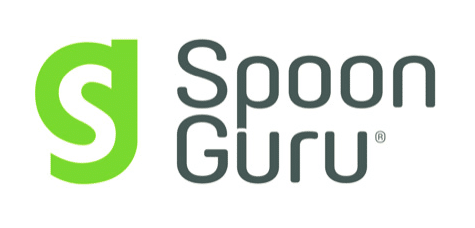
Global: Domo updated Covid-19 global tracker with embeddable country-level stats
Getting good data about the pandemic was difficult. News was moving fast, with each country reacting a different way. How could businesses track and understand these changes in real time, and respond accordingly? Business analytics tech platform Domo updated its free, interactive Coronavirus Global Tracker with county-level infection statistics, stay-at-home orders and testing-by-state data.
It was a simple engineering of publicly available API data, but brought together in a way that provided a useful resource for companies, individuals and journalists alike. From a marketing perspective it helped Domo by both raising front of mind awareness, providing link equity to its websites, and getting people to see how the analytics could be created quickly by skilled people.
![]()
Product innovation and retooling the production line to tackle Covid-19
Global: Fashion giants get stitching facemasks
Many stores and factories worldwide went dark as governments declared nationwide quarantines. However, the lights flickered back on for a few companies who were hard at work pivoting from their usual fashion apparel to producing much needed surgical masks. Luxury designers such as Louis Vuitton, Dior, Gucci, and Prada are just a few examples of brands that jumped in on the action.
The companies promised to produce millions of face masks primarily in high risk areas such as Italy and France. Even H&M and Zara began to take steps to switch their textile manufacturing over to making health materials. Many more brands were also waiting on both the materials and approval from the WHO and EU to begin production.
UK: British Medical Journal creates free information hub
Accessing high quality, reliable medical information in a fast-changing landscape can be difficult for clinicians in any country. With the science unfolding daily, the need for accurate reporting on clinical information was outside the remit for most media companies. To help support global efforts to tackle the pandemic, the British Medical Journal – with its massive portfolio of journals and digital resources – rapidly deployed a “Covid Hub“.
They made the content free to access, effectively creating a specialist journal just for Covid-19. This delivered state-of-the-art knowledge to the world’s healthcare community, and gave journalists a reliable source to trust.
Covid-19: Remote consultations in primary care. This #BMJInfographic offers a quick guide to assessing patients by video or phone call @will_s_t https://t.co/ZNH5aYe2wo pic.twitter.com/I3bC4nGaNE
— The BMJ (@bmj_latest) April 5, 2020
Spain: sports’ retailer Decathlon donates scuba masks to hospitals
With the virus causing severe respiratory illness for some people, there was a sudden need in all countries to increase ventilator capacity. Ventilators and oxygen masks are highly specialist, but in a crisis could there be substitutes? Spain was one of the worst affected countries in Europe where the virus spread before social distancing could be put into place. Decathlon realised some of their products could be repurposed and used as components for oxygen delivery.
They blocked the sale in store and online of its full face scuba masks and donated their total stock to Spanish hospitals. Engineers in Italy managed to convert the items into respirators using state of the art 3D printing technology, meaning they provide life-saving treatment for the most serious cases of Coronavirus. The idea of converting the masks was the brainchild of Belgium doctor Frederic Bonnier, a respiratory physiotherapist at the Erasme Hospital in Brussels. He discovered that by producing a custom valve at the top of the mask where the snorkel normally sits, the mask could be attached to a standard BiPAP machine so it could feed pressurized air into the mask.
Thanks for all the messages about our Easybreath mask! The ingenuity of our global community is amazing. It is important to note that we designed our Easybreath mask for snorkeling, and it’s not medically validated as a ventilator. Read more here: https://t.co/OwphA3rwKx https://t.co/c0zkn4JZf2
— Decathlon USA (@DecathlonUSA) March 25, 2020
Scotland: Brewdog switched beer production to hand sanitiser
Covid-19 is passed by contact, but destroyed by washing or sanitising skin. Hand washing constantly quickly became the new daily routine, but when there’s no water to use with soap, people can be protected by an alcohol-based hand sanitizer. The challenge was that no country had enough sanitizers and all online stores quickly sold out.
Drinks manufacturer Brewdog decided to switch from one alcohol based product to another, with the brewing company deciding to use its distillery to make hand sanitiser, and give it away completely for free to those in need. The move came following reports of widespread shortages, and incidents of the vital hygiene product being stolen from hospitals. A week after going into production, James Watt, the co-founder of Brewdog, revealed that more than 100,000 bottles had been donated to key workers and charities so far.
Container availability for our sanitiser is a challenge & we are packing any container we can get, including small beer bottles (to be used to refill other containers).
Our amazing @brewdog team have packed & donated over 50,000 so far & we will double that by Wednesday. pic.twitter.com/jAcp10eahS
— James Watt (@BrewDogJames) March 28, 2020
UK: National Theatre brings the stage to people’s homes for free
Amid the lockdown, people were craving entertainment, but had no way of experiencing the thrill of a real-life show as venues shut down across most countries. In response, the UK’s National Theatre brought the stage to the screen, streaming free, big-name shows straight to YouTube every Thursday night during the pandemic.
In response to theatres closing amid the Coronavirus pandemic, the publicly-funded arts group launched a new National Theatre at Home initiative, supported by social media features interviewing the cast. Each show was made free for 7 days on the company’s YouTube channel. This massively raised awareness of them as a trusted entertainment brand, and led to an innovation in their business model.
We hope you’re enjoying #OneManTwoGuvnors.
It would mean a lot to us, if you would consider a donation to support us at https://t.co/9McAfGt2hy or via YouTube. #NationalTheatreAtHome pic.twitter.com/zjW1uN023Q
— National Theatre (@NationalTheatre) April 2, 2020
France: LVMH made free hand sanitiser to help French hospitals fight Coronavirus
As hand sanitiser became scarce on supermarket shelves and in hospitals, brands were stepping up to help. Fashion giant LVMH rapidly donated 12 tons of hand sanitiser across Paris’s 39 public hospitals. The company added two new production lines from its Givenchy factory in l’Oise and its Guerlain factory near Chartres.
They produced 15 metric tons of sanitizer and were expected to produce 50 tons more soon after. The corporation, responsible for luxury fashion and cosmetics brands such as Marc Jacobs, Fendi, and Louis Vuitton prepared its production sites to create “substantial quantities” of the gel — or hand sanitizer — under the instruction of chairman and CEO Bernard Arnault. It’s a great example of a national jewel of a brand stepping up, satisfying an urgent need, and getting recognition. It speaks volumes about the values and type of company LVMH is.
Di fronte all’emergenza sanitaria causata dalla pandemia di Covid-19, le Maison italiane del gruppo LVMH uniscono le loro forze e agiscono per sostenere il personale ospedaliero e combattere il virus in Italia. https://t.co/bvWHwc9U20#LVMHJoinsForces #Italy pic.twitter.com/koKF8U86oL
— LVMH (@LVMH) April 2, 2020
UK: F1 teams join forces for ‘Project Pitlane’ to assist with ventilator production
The UK needed to source safe, regulation standard ventilators fast, amid the virus outbreak. A collective of seven UK-based Formula 1 teams, responded to the UK Government’s call for assistance with the manufacture of medical devices to help in the treatment of Covid-19 patients. The teams involved were Aston Martin Red Bull Racing, BWT Racing Point F1 Team, Haas F1 Team, McLaren F1 Team, Mercedes-AMG Petronas F1 Team, Renault DP World F1 Team, and ROKiT Williams Racing.
Their combined efforts, termed ‘Project Pitlane’, were part of a UK industry-wide effort to manufacture and deliver respiratory devices to support the national need. The project pooled the resources and capabilities of its member teams to greatest effect, focusing on the core skills of the F1 industry: rapid design, prototype manufacture, testing and skilled assembly. F1’s unique ability to rapidly respond to engineering and technological challenges allowed the group to add value to the wider engineering industry’s response. Although the engineering didn’t initially deliver, it showed how skilled groups and companies could work together and work differently in tackling a common goal.
Global: EBay offered free services for small businesses eyeing ecommerce
As small business retailers closed their doors, eBay launched an accelerator programme for retailers that only have a brick-and-mortar shop—no ecommerce site. Ebay pledged up to $100 million in support in a project called “Up & Running.” New businesses were able to run an eBay store for free for three months with no selling fees to eBay, which also provided educational webinars and business support.
In March 2020, eBay said it was discouraging price gouging by prohibiting coronavirus-related items and blocking new listings for much-needed health care supplies such as masks and home essentials such as toilet paper.

Adapting creative and campaigns to maintain relevancy during the Covid-19 crisis
UK: PG tips switches 'Cuppas Taste Better Together' campaign to virtual tea breaks
When the pandemic started, marketing couldn’t stop. There were pre-existing media commitments from many brands, and the question became how to use them? The UK’s PG tips tea brand was forced to rapidly alter its £3m ‘Cuppas Taste Better Together’ campaign, which encouraged people to reduce loneliness by encouraging home visits for a cup of tea. This quickly became a problematic message in a time of social distancing and self-isolation.
Their answer was to overhaul the entire campaign, replacing home visits with videos calls where people could still talk online while enjoying a cup of tea. P&G pushed the revamped campaign, with a new hero video, running on TV and online, showing friends and family united over video chat. The approach showed relevancy and warmth to their target audience, used media budgets effectively, and created continued with their campaign goals of top-of-mind awareness.
Staying connected feels more important than ever. Let’s find new ways to get together. #virtualkindness pic.twitter.com/V23qDDSbbD
— PG tips (@PGtips) March 20, 2020
USA: Taco Bell adapts user-generated drive-thru videos for new commercial
As fast food restaurants shut down or reverted to take-out, demand threatened to collapse. People were unsure who was open and who wasn’t, so Taco Bell quickly delivered a tactical message to say their stores were still working. Their new Covid-19-“safe drive-thru” process included sticker-sealed bags, and adjustments to their process. They told the story without using their own film crews, instead showcasing user-generated videos filmed on customer’s phones.
“When you need a little light, it helps to open a window,” a voiceover said as consumers’ videos appear, like windows, and soon fill up the screen. The campaign was assembled remotely by the chain’s creative agency, Deustch LA and ran on TV, social, digital video and radio through to June 2020, replacing previously planned efforts that were also expected to rely on user-generated content. The 15-second “Windows” spot ends with the voiceover saying “let our drive-thru help you get through.”
Ireland: Guinness made up for missed St Patrick's day
Alcohol brands faced a major challenge as bars and social gatherings shut down across the globe, with events and celebrations cancelled. For a CPG brand that can still be purchased and wants to find ways to continue engaging its consumers, simply advertising home drinking could seem inappropriate. Guinness addressed the pandemic through a new ad, released on March 20. The Irish beer company acknowledged that St. Patrick’s Day wouldn’t be the same in 2020 due to the parade and bar closures.
However, the company vowed to “march again” in a rallying cry – and pledged $500k through its Guinness Gives Back Fund to “help the communities where we live, work and celebrate”. Guinness Ireland also pledged €1.5 million to support Irish bar staff (many of whom were laid off temporarily), and elderly citizens.
You may have seen this Guinness Poster that wasn’t a Guinness Poster? Well, we love it. Thanks to @RedBalloonLuke and the @OneMinuteBriefs community for helping us share this important message. https://t.co/tKHMVBAlPZ pic.twitter.com/M4eOhyz1Gp
— Guinness Ireland (@GuinnessIreland) March 27, 2020
UK: Independent local retailers joined forces to help feed hospital staff and keep businesses afloat
In the crisis, healthcare workers were stretched and exhausted. In the UK alone, more than 1m people work for the National Health Service, with about the same working in adult social care. In many areas, groups of independent retailers and restaurants pulled together during the crisis to help local hospitals and key workers.
One example below is from London’s Lewisham district where Sportsbanger raised money through the sales of their NHS hoodies and T-shirts to feed frontline NHS staff on shift. They collected meals from a different business each day and delivered them to local hospitals. This way the NHS staff both got fed and also continued to support small businesses.
UK: Heinz sells online for first time with £10 food bundle and discount for key workers
Online delivery slots at supermarkets were booked-up 3 weeks in advance and local shop visits were hampered by long queues from social distancing measures and lockdown restrictions. in the UK, this meant some people were unable to easily order food, plus time-poor key workers and vulnerable people were being left behind. Food manufacturer Heinz responded with its first ever direct to consumer online shop, with free delivery for key workers.
The first offering, a £10 ‘Heinz to Home’ bundle, was made up of 16 cans – eight Heinz beans, four Heinz Hoops and four Heinz Cream of Tomato Soup. The £3.50 for postage, delivered within three days of ordering, was waived for people with a Blue Light Card, a discount service for NHS, Emergency Services, Social Care Workers and Armed Forces. This strategic shift could catapult Heinz into a key CPG direct time consumer brand.
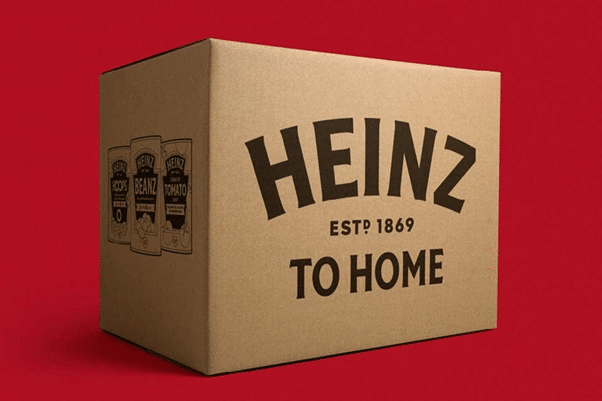
Global: P&G creates community spirit with #DistanceDance Tik Tok challenge
The pandemic was waiting for the next ‘Ice Bucket Challenge’ to break the lockdown monotony. With more people than ever reliant on social media to keep a sense of community, Procter & Gamble teamed up with the number one Tik Tok star of the moment, Charli D’Amelio, to promote a different kind of dance challenge that could be shared online. It’s difficult for brands to get into this type of space in a crisis without logic and authenticity, so the partnership with an influencer gave that sense of this being native to social media.
The #DistanceDance challenge was the brainchild of P&G’s chief brand officer Marc Pritchard, who worked with agency Grey to create the charity challenge at short notice. Within the first week of its launch, #DistanceDance has achieved more than 8bn views and 1.7m imitation dances from celebrities, college mascots, major sports leagues, influencers and families.
@charlidamelioStay home & do the ##distancedance. Tag me & the hashtag in your video. P&G will donate to Feeding America & Matthew 25 for first 3M videos ##PGPartner
Consumer brands can’t cure Coronavirus, but their ingenuity and rapid adaptation helped improve the lives of others and maintain businesses at a time when market demand in most sectors collapsed.
If you’re a marketer or business leader, then also see our pages on communications audits and Covid19 crisis management support.
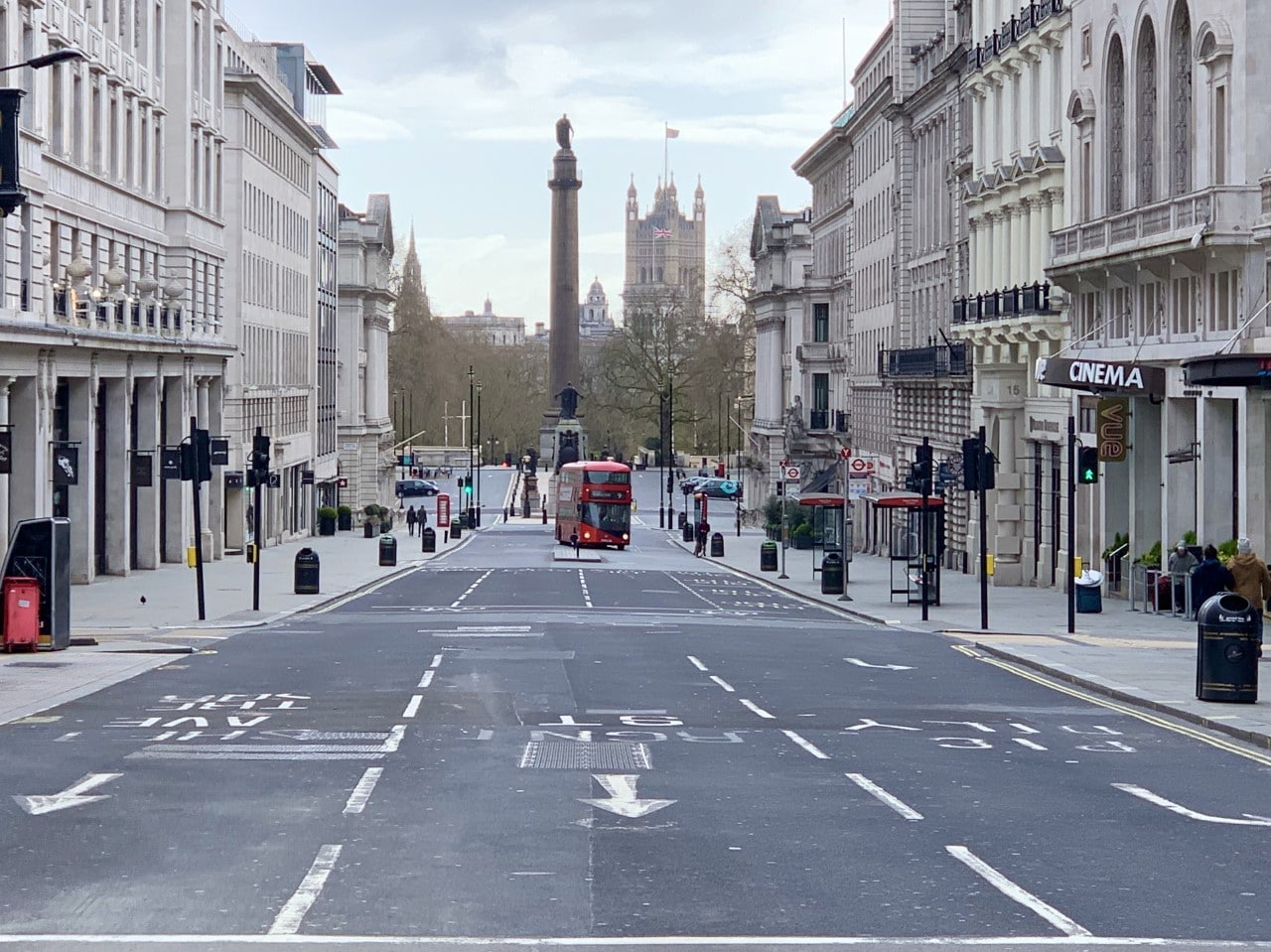
Covid19 solutions to tackle business disruption
Business life is full of disruption and you need a partner that’s agile and can adapt to your needs. That’s why we put in place a suite of approaches to help you manage the business impact of Covid19
Training solutions for brands, marketing teams and their organisations
We offer a comprehensive range of training courses to give teams leading-edge knowledge and skills in marketing. Courses are available online and as face to face workshops.
